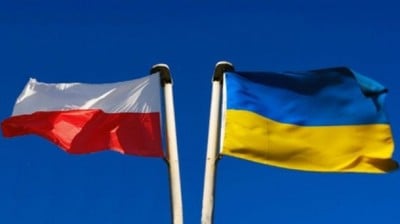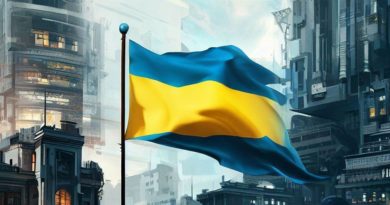Poland Could Intervene in Ukraine, Polish Authorities Say

All Global Research articles can be read in 51 languages by activating the Translate Website button below the author’s name (only available in desktop version).
To receive Global Research’s Daily Newsletter (selected articles), click here.
Click the share button above to email/forward this article to your friends and colleagues. Follow us on Instagram and Twitter and subscribe to our Telegram Channel. Feel free to repost and share widely Global Research articles.
Global Research Wants to Hear From You!
***
Could Poland intervene in Ukraine? Russian President Vladimir Putin seems to consider the possibility. At May 28 press conference during his visit to Uzbekistan, he said:
“the Polish authorities say they are ready to send their contingents. We can hear Polish language, so there are many mercenaries from Poland.” He added: “if some contingents from European countries enter Ukraine together with the Poles, others will later leave whereas the Poles will never do. This is obvious, at least for me. I might be wrong but I doubt that.”
The Russian President described this scenario as an “escalation” and “yet another step towards a large conflict in Europe and globally.”
Putin’s impressions are somewhat echoed by the Polish authorities in Warsaw. In an interview published last week in the Gazeta Wyborcza, Poland’s Foreign Minister Radek Sikorski claimed his country should not exclude the possibility of sending troops to neighboring Ukraine:
“We should not exclude any option. Let Putin be guessing as to what we will do.”
A spokesperson for Poland’s Defense Ministry, Janusz Sejmej, however, told Polish journalists that he had “no knowledge of that.”
Sikorski’s remark is in fact quite vague, just like French President Emmanuel Macron’s similar statements made earlier this year. Macron, while defending “strategic ambiguity”, has suggested “European troops” (“but not NATO”) “could” be deployed to Ukraine. It is the same kind of Schrödinger’s cat’s reasoning employed by analysts and US officials such as Jahara Matisek (Military Professor at the U.S. Naval War College), Alex Crowther (Retired US Colonel), and Philips P. O’Brien (Head of the School of International Relations at the University of St. Andrews), who have argued that “European forces would be acting outside the NATO framework and NATO territory”, and thus “any casualties would not trigger an Article 5 response and draw in the United States”. After all, they reason, “Russia’s opponent would not be NATO but a coalition of European countries seeking to balance against naked Russian imperialism”. In other words, it would be a coalition of NATO members which, however, is not NATO at all.
The problem, as I wrote earlier, is that NATO combat troops (or is it just troops from NATO state members?) have already been arriving in Ukraine in large numbers.
This has been confirmed by NATO’s Secretary General Jens Stoltenberg, who said that “several NATO allies have men and women in uniform at the embassies”, but claims they are merely “giving advice.” Stoltenberg also announced that NATO state members have air defense systems ready to be sent to the Eastern European country. He stressed that NATO members have the “right” to “help” Ukraine. This however does not make the Atlantic Alliance itself a party to the conflict as the reasoning – “strategic ambiguity” or not – is quite questionable.
Ukrainian-Polish quarrels aside, Warsaw has been a logistical hub for aid reaching its neighboring country since February 2022. Amid a trade dispute, former Prime Minister Mateusz Morawiecki famously said his country no longer had arms to send to Kyiv (in September 2023). However, the new Polish government seems to have placed Ukraine back at the center of its foreign policy.
As I wrote before, the two neighboring countries, already in May 2022, clearly took steps towards a future Ukrainian-Polish confederation, as seen with plans announced back then by Ukrainian President Volodymyr Zelensky for bilateral agreements pertaining to joint border and customs control, among other things. On May 3, Andrzej Duda (who serves as Poland’s President to this day) went so far as to state that he had hopes that one day “there will be no border” between the two countries. It remains to be seen whether such projects shall gain traction again.
Historically, Ukrainian-Polish relations are complex: the Western portion of Ukraine was in fact ruled by Poland on different occasions, including during the age of the then Polish-Lithuanian Commonwealth, in a process that started after 1349. By 1569, most of “Ruthenia” (which largely corresponds to Western Ukraine) had become Polish territory. The pressures for so-called Polonization, which included forced conversions to Roman Catholicism, and the enserfment of the peasantry by Poland, alienated Cossacks and Christian Orthodox peasants.
In 1648, the Cossack leader Bohdan Khmelnytsky famously led a rebellion against the Polish King, founded the Cossack Hetmanate, and was hailed as a liberator. In 1654, with the Pereyaslav treaty, this new Cossack state, considered a predecessor to Ukraine, pledged its loyalty to the Russian Tsar. This is not just ancient history – there is an ongoing historiographic debate with, as often happens, political repercussions: to this very day, Khmelnytsky is hailed by some as a Ukrainian national hero and a precursor of Ukrainian nationalism (because of his fight against Polish domination) – while others criticize him for his alliance with the Tsar.
More recently in History, Ukraine was once again ruled by Poland after the 1921 Riga peace treaty, and anti-Polish sentiments remain part of Ukrainian nationalism to this day. The way both nations politicize 20th century history has in fact often hampered their bilateral relations. During World War II, the Ukrainian Insurgent Army (UPA), glorified as a “heroic” organization in post-Maidan Ukraine, cooperated with the Nazi German Waffen-SS and committed various war crimes against Poles (as well as Jews and others). Again, this is not just 20th century history, but has echoes today, as seen with Ukraine’s infamous far-right problem.
The so-called Eastern Flank is a strategic region for the Atlantic Alliance. NATO’s enlargement, both eastwards and northwards towards the Arctic, is certainly one of the key causes of today’s crisis since 2014. Poland has wished for a while to make a comeback to the stage of History and geopolitics, so to speak – even aspiring for regional leadership in Europe. It remains to be seen whether or not Polish aspirations materialize in the form of a tragic escalation that can only bring the world closer to global thermonuclear war.
*
Note to readers: Please click the share button above. Follow us on Instagram and Twitter and subscribe to our Telegram Channel. Feel free to repost and share widely Global Research articles.
This article was originally published on InfoBrics.
Uriel Araujo is a researcher with a focus on international and ethnic conflicts. He is a regular contributor to Global Research.


